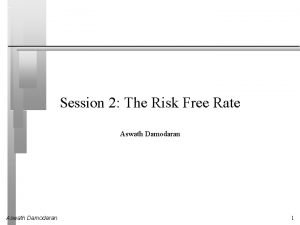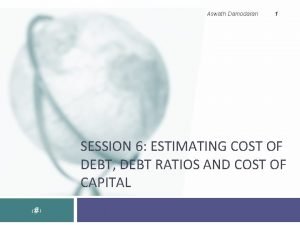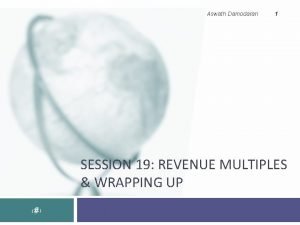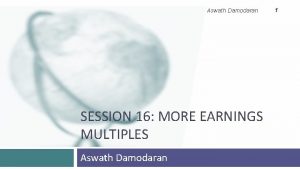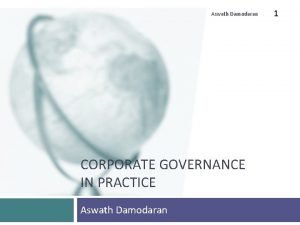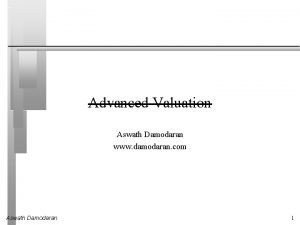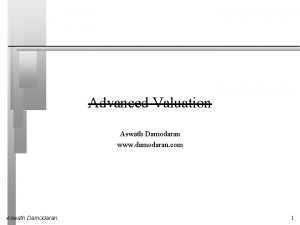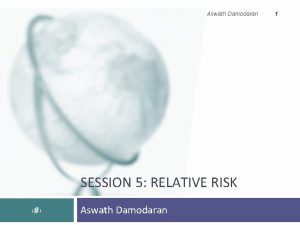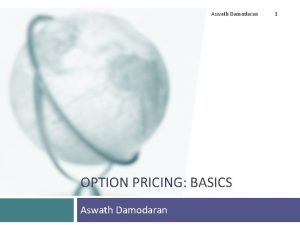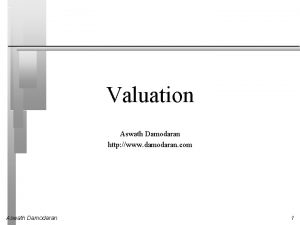TRADE ON THE NEWS INFORMATION TRADING Aswath Damodaran










- Slides: 10

TRADE ON THE NEWS? INFORMATION TRADING Aswath Damodaran

Information and Value • • Investors attempt to assess the value of an asset based upon the information that they have about that asset at that point in time. At the same time, different investors will arrive at different assessments of value for the same asset – – • Because the information they have is different Because they have different ways of processing the same information The price is determined by demand supply. 2

Information and Prices in an Efficient Market 3

A Slow Learning Market… 4

An Overreacting Market 5

Strategies for information trading • • • Trade ahead of the news: To the extent that you can foresee or anticipate news announcements about the company, you can trade ahead of the news (buying before expected good news and selling before expected bad news). Trade on the news: If you believe that news creates volatility, you can try to trade on that volatility (with options) on the news. Whether you buy or sell volatility will depend upon you whether you believe that the volatility change is temporary or permanent. Trade after the news: If you believe that markets are either slow learning or over reacting, you will trade after the news. 6

I. Ahead of the news News source Insider or private information: You may have received advance notice of the news story. That would put you on the wrong side of the law in the US but may be allowed in other markets. Rumor mills: Markets are filled with rumors about companies, but you may have a more reliable rumor source. Research: It is possible that research can give you at least an indication of upcoming news. Reliability Depending on where you get the information, the information can range from “guaranteed” to “very speculative” Your investment strategy will vary depending upon the reliability (affecting how much you invest… and how diversified you choose to be) 7

II. On the news Trade on “price” reaction: If you believe that markets are mistaken in their assessment of the effects of information on value, you can trade on the news, buying if you think that markets have not reacted enough or selling if you think that markets have over reacted. Trade on volatility: Big news stories cause turmoil in markets and even if the price reaction is right (in terms of change in price), the volatility effects may not be. Thus, just as the price can go up too much or too little, the volatility shift after a news story can be too high or too low. If you are able to trade volatility, using options, you can take advantage of the volatility mistake, buying if the shift in volatility is too low and selling if it is too high. 8

III. After the news • • Slow learning markets: If you believe that markets are slow learning, you will buy (sell) after good (bad) news, expecting the price to continue to drift up (down) after the news announcement. Overreacting markets: If you believe that markets over react, you will buy (sell) after bad (good) news, expecting the price to continue to drift up (down) after the news announcement. 9

The timing choice & its costs With any information based trading strategy, you do have to make judgments about timing: When you will trade How quickly you execute How long you will hold the investment. As a follow up, you also have to think about the transaction mechanisms you will need in place and the resulting costs. In doing all of this, especially in markets where there are restrictions on insider information, you have to make sure that you are operating on the right side of the law. 10
